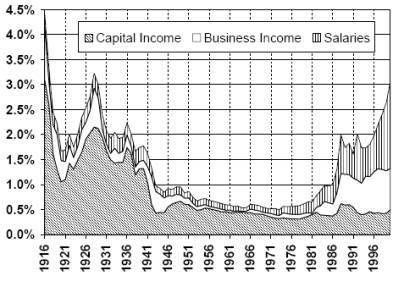Share of top 0.01% of taxpayers in theUSA from The Evolution of Top Incomes: A Historical and International Perspective Piketty, Thomas; Saez, Emmanuel; American Economic Review, May 2006, v. 96, iss. 2, pp. 200

Just to be clear, I am not saying there are votes in the top 0.01 % who are getting 3% of personal income all by themselves. There are votes to be won by soaking them and spreading it out thin, and even Rham Emanuel has figured that out.
6 comments:
Me, I found nothing of interest in Barack Obama's foreign policy speech. Fine America will lead again, if Obama is President and we will work on less a nuclear proliferation. What of Iraq? Nothing. I want us out of Iraq, and that is what matters in foreign policy. Obama is still avoiding tough issues. I am tired.
anne
Better than the Warrior Princess of course, but I want more from Obama, and a health care plan as well.
The issues for me, and everyone I know are Iraq and health care, and all else reloves about these. No one I know will support Hillary Clinton, so we need either Obama or Edwards to be the candidate. I am angry enough not to vote for president, if the Warrior Princess is nominated. Good grief.
anne
Beyond any complaining, I will support vote for any Democratic candidate for any and every office, other than the Warrior Princess for President.
anne
Remembering....
http://www.nytimes.com/books/98/03/15/home/halberstam-best.html
November 12, 1972
How We Got Into the Messiest War In Our History
By VICTOR S. NAVASKY
THE BEST AND THE BRIGHTEST
By David Halberstam.
The Best and the Brightest," Pulitzer Prize winner David Halberstam's latest, most important and impressive book, sets out to discover why America got involved in the worst and messiest war in our history. "What was it about the men, their attitudes, the country, its institutions and above all the era which had allowed this tragedy to take place?" They were, after all, "the best and the brightest," so why did it happen?
It happened, Halberstam concludes, because, "they had, for all their brilliance and hubris and sense of themselves, been unwilling to look and learn from the past." They ignored Hanoi history and misunderstood Munich history. "And they had been swept forward by their belief in the importance of anti-Communism (and the dangers of not paying sufficient homage to it)." The Age of the Pentagon Papers is, in reality, the Age of the Pumpkin Papers.
It is difficult to argue with Halberstam's reasonable, compelling and persuasively presented thesis. The rhetoric is occasionally overblown, but he is right, they were "swept forward" by the sense of power and glory, omnipotence and omniscience of America in this century. They were "America" and they did want to be defined as "being strong and tough; but strength and toughness and courage were exterior qualities which would be demonstrated by going to a clean and hopefully antiseptic war with a small nation, rather than the interior more lonely kind of strength and courage of telling the truth to America and perhaps incurring a good deal of domestic political risk."
Moreover, Halberstam is able to bring his case alive through the artful use of warehouses of insider anecdotes, vignettes and detail. What better symbol of the illusion of an antiseptic war than Gen. William Westmoreland breakfasting in his underwear "in order to keep his fatigues pressed?" What more vivid way to convey the cold-war assumptions ingrained in L.B.J. than to report that the first thing that raced through his mind as the shots were fired that November day in Dallas was "that the Communists had done it?" How more dramatically to capture the stultifying atmosphere of our embassy in Saigon than to show Ambassador Frederick E. Nolting Jr., replacing a portrait of Thomas Jefferson with one of George Washington, in anticipation of a TV interview, because Jefferson was too controversial? ...
anne
I remember being surprised by David Halberstam wandering about the Divinity School library and asking him whether he had finally come to recognize his truer self. He laughed all the way down back through the stacks. I have no idea however what the heck he thought knew about football and told him so, which also made him laugh. He would tease me about being bird obsessed, which was not funny at all.
anne
Post a Comment